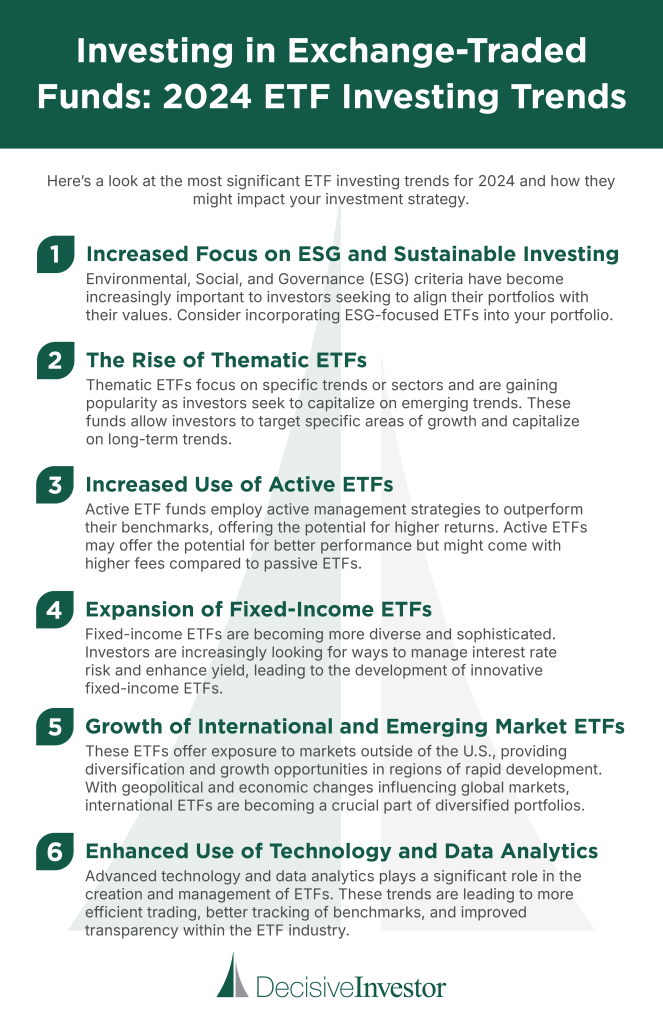
As we move through 2024, the investment landscape is evolving rapidly, and exchange-traded funds, ETFs, continue to play a central role in modern portfolios. Investing in exchange-traded funds has become a popular choice for investors due to their diversification, liquidity, and cost-effectiveness. This year, several key trends are shaping the ETF market, offering both opportunities and challenges for investors. Here’s a look at the most significant ETF investing trends for 2024 and how they might impact your investment strategy.
1. Increased Focus on ESG and Sustainable Investing
Environmental, Social, and Governance (ESG) criteria have become increasingly important to investors seeking to align their portfolios with their values. In 2024, the trend towards ESG and sustainable investing continues to gain momentum. ETFs focused on ESG criteria are seeing significant growth, as investors look to support companies that prioritize sustainability and ethical practices.
Consider incorporating ESG-focused ETFs into your portfolio to align your investments with global sustainability goals while potentially benefiting from the growth of companies committed to responsible practices. If your focus is diversifying your portfolio, it helps to choose the best stock trading software.
2. The Rise of Thematic ETFs
Thematic ETFs, which focus on specific trends or sectors, are becoming more popular as investors seek to capitalize on emerging trends and innovations. Themes such as technology advancements, renewable energy, and healthcare innovation are driving the creation of new thematic ETFs. These funds allow investors to target specific areas of growth and capitalize on long-term trends.
Research and identify thematic ETFs that align with your investment interests and long-term goals. However, be mindful of the higher volatility that thematic ETFs may exhibit compared to broader market ETFs.
3. Increased Use of Active ETFs
While ETFs have traditionally been associated with passive management, there is a growing trend towards active ETFs. These funds employ active management strategies to outperform their benchmarks, offering the potential for higher returns. The rise of actively managed ETFs reflects a shift in investor preference for strategies that can adapt to market conditions and seek alpha.
If you’re open to active management, consider adding actively managed ETFs to your portfolio. Active ETFs may offer the potential for better performance but might come with higher fees compared to passive ETFs. Some trading platform software, including Decisive Investor, allows its investors to keep 100% control of their investments.
4. Expansion of Fixed-Income ETFs
In response to changing interest rate environments and economic uncertainty, fixed-income ETFs are becoming more diverse and sophisticated. Investors are increasingly looking for ways to manage interest rate risk and enhance yield, leading to the development of innovative fixed-income ETFs, including those that focus on floating rate bonds, municipal bonds, and emerging market debt.
Explore the expanding universe of fixed-income ETFs to find those that meet your income needs and risk tolerance. Keep an eye on interest rate trends and adjust your bond ETF allocations accordingly.
5. Growth of International and Emerging Market ETFs
As global economic dynamics shift, international and emerging market ETFs are gaining traction. These ETFs offer exposure to markets outside of the U.S., providing diversification and potential growth opportunities in regions experiencing rapid development. With geopolitical and economic changes influencing global markets, international ETFs are becoming a crucial part of diversified portfolios.
Consider diversifying your portfolio with international and emerging market ETFs to tap into global growth opportunities and reduce reliance on domestic markets. If your focus is diversifying your portfolio, it helps to choose the best stock management software.
6. Enhanced Use of Technology and Data Analytics
The integration of advanced technology and data analytics is transforming the ETF industry. From sophisticated trading algorithms to enhanced data-driven insights, technology is playing a significant role in the creation and management of ETFs. This trend is leading to more efficient trading, better tracking of benchmarks, and improved transparency.
Stay informed about technological advancements in the ETF space and consider funds that leverage these innovations for improved performance and efficiency.
Investing in exchange-traded funds, the investment landscape in 2024 is characterized by innovation, diversification, and a growing focus on sustainability and technology. As you navigate these trends, it’s important to align your ETF investments with your financial goals, risk tolerance, and investment horizon. By staying informed and adapting to emerging trends, you can make the most of the opportunities offered by ETFs and build a resilient and dynamic investment portfolio.


